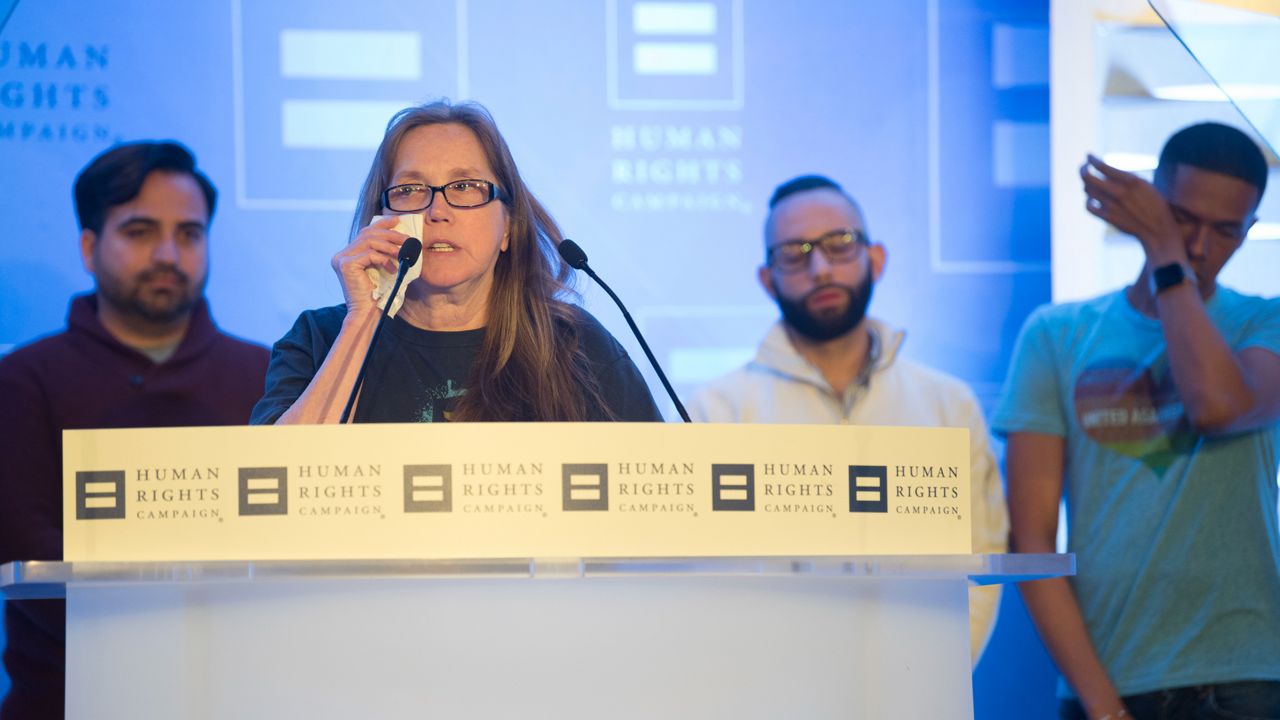POLK CITY, Fla. — This is a tough time for Christine Leinonen, who lost her son Christopher on June 12, 2016 during the Pulse nightclub shooting in Orlando.
“The single toughest day is Christmas; I never spent a Christmas without my son,” she says. “But this is the roughest month. It starts with Mother’s Day, and then Christopher’s birthday on the first and then he died on the 12th. It’s not as intense as Christmas but it grows in intensity with each passing marker that I know I’m not experiencing my son’s company.”
What You Need To Know
- June 12 is the fifth anniversary of the Pulse nightclub mass shooting
- Christine Leinonen's son Christian was one of the 49 victims who died
- Leinonen has long been opposed to Pulse owners controlling a museum or memorial
- On Wednesday, the U.S. Senate passed a bill making the nightclub a national memorial
In the wake of the Pulse tragedy, Leinonen, a former police officer and an attorney who once worked for Pinellas County, became an activist and advocate for both LGBTQ+ rights and gun control.
“I was always my son’s ally, but I was never an activist,” she says. “I didn’t realize until after my son died how many gay people there are out there who don’t have loving homes, supportive homes — they’ve been kicked out of their home or they’ve been forced to do conversion therapy, and I see where they actually need to be supported, not just as an ally but as a willing activist.”
On the gun issue, though, she admits to being wearied by the lack of progress, as well as the bureaucracy of advocacy:
“I still want to see assault weapons and high-capacity magazines banned, but I think a lot of those movements aren’t doing anything except for (existing as) a nonprofit. It’s almost a self-sustaining animal, they have to act like they’re doing something when they’re really just getting donations to support their nonprofit. Mothers Against Drunk Driving, they got laws changed.”
The nonprofit drawing the majority of Leinonen’s ire is OnePulse, the foundation started by Pulse owner Barbara Poma after the shooting with the mission of turning the club into a museum and memorial that “opens minds, educational programs that open eyes and legacy scholarships that open doors.”
Leinonen made national headlines for spearheading opposition to the foundation, blaming unaddressed code violations and lax security at Pulse for the shooting and calling OnePulse’s expansive memorial ambitions exploitative. She is part of a suit currently making its way through the civil process that seeks to wrest control of any memorial custodianship from the club owners.
“They get away with convincing the media that they’re the victims, when they created victims like me,” she alleges. “(Poma) markets herself as a victim, and starts the OnePulse Foundation… She marketed the whole Pulse museum to the Orange County tourism board so that they would agree to give her taxpayer money, because she convinced them that having it would fill up a lot of those hotel rooms that have to be filled every day.
“So my son’s death is being marketed as a tourist attraction to bring in money to fill hotel rooms. That’s obnoxious. That offends my sensibilities, you can hear how angry it makes me. How dare they take my son’s beautiful life and turn it into some tourist trap?”
Earlier this week, the U.S. Senate passed a bill aiming to make the nightclub a national memorial. (President Biden has pledged to sign the bill into law.) While certainly not a guarantee that OnePulse’s plans will come to fruition, the legislation legitimizes the concept in general.
Leinonen isn’t surprised by the announcement, though she has her own opinion as to why it happened.
“One (reason) is because of 'cancel culture' -- they don’t want to be labeled homophobic, which they could be potentially,” she says. “ But it’s also because they view it as a shooting that hapened becuase of a radicalizd Muslim, and republicans are notoriously anti-Muslim. I believe that’s why they agreed to it, because they consider this a Muslim attack on America.
Leinonen asserts that she’s never been against a Pulse memorial, per se. She just wants it handled in an appropriate manner, and doesn’t want the people she feels are at least partly responsible for her son’s death to profit from it, either monetarily or in terms of public image.
“I have mixed feelings about the national memorial,” she says. “I love it in theory, but that’s going to put more funds into the OnePulse Foundation because they're the ones that are going to be controlling it, it won’t be the government controlling it at all. That part I don’t like… These kids should be honored with love, not exploited.”



